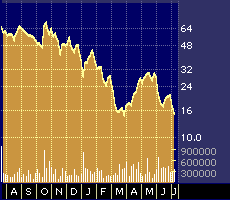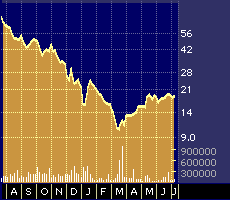
2000 Expected to Set New IPO Record
2000 Expected to Set New IPO Record
by Hal Plotkin
Silicon Valley Correspondent
Major technology spinoffs, renewed interest in biotechnology start-ups, action in the insurance sector, and surging venture-capital investments are expected to combine to make 2000 another banner year for initial public offerings.
“It could very well be another record year,” says Richard Peterson, an IPO analyst with Securities Data, based in New York.
Peterson says IPOs could generate a whopping $100 billion next year, up from the record $69 billion raised by companies that went public in 1999.
This year’s biggest IPO is expected to come from AT&T Corp. {T}, which plans to offer a new tracking stock for the firm’s wireless unit. That IPO could be the single largest in history, bringing in as much as $10 billion.
“The one thing everyone agrees on is that this is going to be a fast-growing market,” says Brian Hammond, senior editor at Telecommunications Reports, a trade journal based in New York.
3Com Corp.’s {COMS} upcoming spinoff of its Palm Pilot unit is expected to generate a more down-to-earth but still respectable $100 million, according to filings with the Security and Exchange Commission. The stock could do particularly well in the post-IPO market, however, if some of the more than five million Palm Pilot owners start bidding the issue up.
“It’s going to be a long time before any [competitors] get anywhere close to 3Com’s market share,” says Peter Lieu, managing director of Needham & Co., based in Boston. Palm currently has a 73 percent share of the overall U.S. market for personal digital assistants.
Biotech IPOs are also expected to move back into the spotlight next year on the heels of the recent strong performance of the Caliper Technologies Corp. {CALP} and Maxygen Inc. {MAXY} IPOs, which are up 200 percent and 300 percent, respectively, since both firms went public in recent weeks.

CALP post-IPO stock performance

MAXY post-IPO stock performance
According to BioCentury, a biotech industry newsletter based in San Carlos, Calif., at least 23 other private biotech firms are angling to go public in the not-too-distant future.
The most notable include Aclara Biosciences and IntraBiotics Pharmaceuticals Inc., both based in Mountain View, Calif.; New York-based Antigenics LLC; Diversa Inc. and Sequenon Inc., both based in San Diego; and Orchid Biocomputer Inc. based in Princeton, N.J.
“The industry’s gathering momentum,” says Jim McCamant, publisher of the Medical Technology Stock Letter, based in Berkeley, Calif. “We’re going to see a lot more action next year. The indexes are up over 100 percent over where they were a year ago, and people are moving money into the group again.”
The somewhat less-glamorous but still-lucrative insurance market is also expected to bring buckets of fresh cash to the trading floors in 2000. Metropolitan Life Insurance Co., for example, plans to raise $6.5 billion in an IPO while John Hancock Financial Services Inc.’s IPO is slated to raise $2.04 billion sometime early next year.
But perhaps the best indicator of next year’s IPO prospects can be found in the record-breaking capital flows from venture-capital funds to pre-IPO firms.
Venture investments reached a record $12.98 billion, dispersed to 1,190 companies, during the third quarter of 1999, according to Venture Economics, a trade journal based in Newark, N.J., and the Washington-based National Venture Capital Association.
That performance, over just one quarter, was more than the entire amount placed by venture firms in all of 1996 and nearly as much as was invested in pre-IPO firms in all of 1997.
Internet firms continued to be the leading recipients of venture investments during the third quarter of 1999, netting about $5 billion. Computer-software and services firms placed second, with $1.98 billion, and communications firms third, with $1.91 billion.
“What we’re seeing is a powerful entrepreneurial surge fueled by an apparent decision on the part of capital markets that this is an area of great merit,” says Steven Lazarus, of Arch Venture Partners, based in New York, in a statement that accompanied the recent release of the NVCA figures. “There are many factors which are converging to create this strong investment environment, including high levels of recent fund-raising, an active market for initial public offerings, a strong Internet sector and an increasing number of entrepreneurs with promising ideas.”


